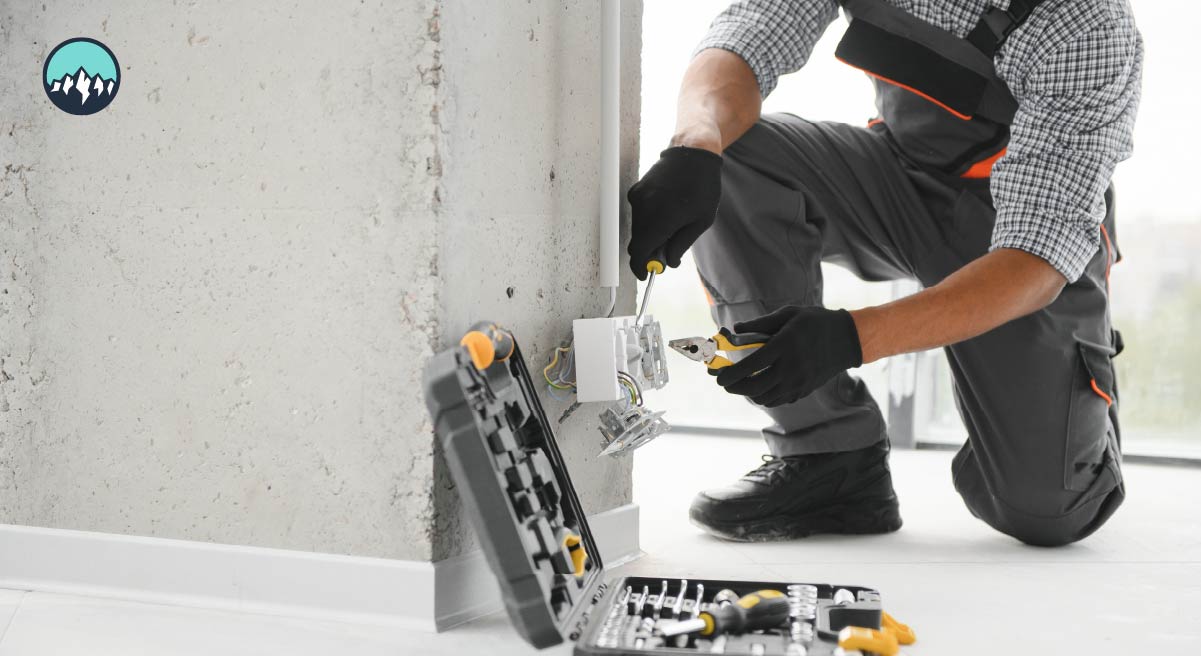Immigrate to Canada as an Electrician
06 Nov 2024

Canada is an enticing destination for skilled workers, especially electricians in high demand across the country. With an expanding economy, generous living standards, and diverse communities, Canada offers both job security and a desirable quality of life. This guide explores how electricians can immigrate to Canada, detailing requirements, immigration pathways, and tips to make the process smoother.
Why Canada Needs Electricians

Canada's need for skilled electricians is growing, largely due to its construction boom, infrastructure upgrades, and evolving technology in energy-efficient systems. These factors have led to an increased demand for trained professionals who can work with complex electrical systems safely and efficiently. By choosing Canada, electricians can secure high-quality jobs and enjoy a rewarding career in one of the world's most welcoming countries.
Benefits of Immigrating to Canada as an Electrician
There are several benefits to working as an electrician in Canada, including:
- High Demand: Electricians are consistently on the list of in-demand occupations.
- Competitive Salaries: Canadian electricians earn substantial wages, often above the national average.
- Job Security: Electricians benefit from strong job security due to their essential role.
- Opportunities for Advancement: With experience, electricians can progress into roles like project management or electrical inspection.
- Quality of Life: Canada is known for its excellent healthcare, education, and work-life balance.
Eligibility Criteria to Immigrate to Canada as an Electrician
To immigrate as an electrician, applicants need to meet certain eligibility criteria related to both skills and experience:
- Educational Qualification: Most Canadian provinces require electricians to have at least a secondary school diploma and relevant technical training.
- Experience: Typically, electricians need a minimum of two years' full-time work experience in their trade. However, specific provinces may have additional requirements or certification processes.
- Language Proficiency: A strong grasp of either English or French is essential. The Canadian Language Benchmark (CLB) assesses language skills, with a CLB level of 5 or higher often required.
- Licensing and Certification: Electricians must be certified in most provinces to work legally. Foreign-trained electricians may need to pass the Red Seal Exam or complete apprenticeship requirements.
- Health and Character Checks: As part of the visa application, background checks and health screenings are standard.
Pathways for Electricians to Immigrate to Canada

Canada offers several immigration pathways prioritizing skilled workers like electricians. Here are the top programs.
Express Entry System
The Express Entry system is Canada's primary immigration pathway for skilled workers, offering a relatively quick route for qualified electricians. Electricians fall under the Federal Skilled Trades Program (FSTP), which is part of Express Entry.
Requirements for the Federal Skilled Trades Program:
- Work Experience: At least two years of full-time experience in the last five years.
- Job offer or Canadian certificate of qualification: Either a valid job offer for full-time employment in Canada or a Canadian certificate of qualification in the electrical trade.
- Language Proficiency: Achieving the minimum score on the language proficiency test.
Electricians applying through the Express Entry system are scored using the Comprehensive Ranking System (CRS). This scoring system takes into account factors like age, education, work experience, and language skills. High-scoring candidates receive an Invitation to Apply (ITA) for permanent residency.
Provincial Nominee Programs (PNP)
Each Canadian province has its Provincial Nominee Program (PNP) to address its specific labor needs. Many provinces actively seek electricians, offering streamlined immigration for those willing to work and settle in their province. Below are the most popular options:
- British Columbia PNP: British Columbia has a high demand for trades, including electricians. The Skills Immigration and Express Entry BC streams provide options for skilled workers with job offers.
- Ontario PNP: Ontario is a popular destination for electricians, particularly in the construction and energy sectors. Ontario's In-Demand Skills Stream often includes trades, making it easier for electricians to qualify.
- Alberta and Saskatchewan PNPs: These provinces are also known for infrastructure projects, and their PNPs prioritize skilled trades.
Process for PNP
- Apply through the province’s PNP portal.
- Upon receiving a provincial nomination, you get additional CRS points, which boosts your Express Entry score and increases chances for an ITA.
Atlantic Immigration Program (AIP)
The Atlantic Immigration Program (AIP) allows skilled workers to immigrate to Canada's Atlantic provinces—Newfoundland and Labrador, Prince Edward Island, Nova Scotia, and New Brunswick. This pathway benefits electricians interested in living in Atlantic Canada, where there is a growing need for skilled trades.
To qualify, you need a job offer from an employer in one of these provinces. AIP offers a streamlined process with additional support for settling and integrating into the community.
Steps to Apply for Canadian Immigration as an Electrician
Step 1: Evaluate Your Eligibility
Begin by assessing which immigration pathway best suits your qualifications.
Step 2: Gather Required Documents
Key documents include a valid passport, educational certificates, employment references, proof of work experience, language proficiency test results, and background checks.
Step 3: Apply for Certification
For provinces requiring licensing, complete any necessary exams or certifications, like the Red Seal, to qualify for local electrician roles.
Step 4: Submit Profile to Express Entry or PNP
For the Express Entry system, create a profile online and complete the required forms. For PNP, follow the specific province's application steps.
Step 5: Receive an Invitation and Apply for PR
High-scoring candidates in Express Entry or those with PNP nominations will receive an ITA. Submit the full permanent residency application and await approval.
Licensing Requirements for Electricians in Canada
Licensing requirements differ by province, but most provinces mandate certification to work as an electrician. The Red Seal Program is a standard certification for electricians and is recognized across most provinces. Passing the Red Seal Exam confirms an electrician's ability to work at the industry standard level across Canada, giving an edge to those with this certification.
Job Prospects and Salary Expectations for Electricians in Canada

Electricians (NOC 72200) in Canada earn competitive salaries, with variations based on experience, specialization, and location. According to Canada's Job Bank, the average hourly wage for electricians ranges from 19 CAD to 47.30 CAD, depending on the province.
Provinces with High Demand and Top Salaries for Electricians
Several provinces stand out in terms of both demand and compensation for electricians.
Alberta
Known for its oil and gas industry, Alberta has a strong demand for electricians in both industrial and residential sectors. Wages here are among the highest in Canada, with hourly rates often reaching the upper end of the scale.
Ontario
As Canada's most populous province and economic hub, Ontario has an ongoing need for skilled electricians in urban centers like Toronto and Ottawa. Electricians here work in both large-scale commercial projects and residential developments, benefiting from competitive wages.
British Columbia
With a strong emphasis on sustainable building and energy, British Columbia offers lucrative opportunities for electricians, particularly those with expertise in renewable energy systems and eco-friendly construction projects.
Quebec
Although wages in Quebec are slightly lower than in Alberta or Ontario, the cost of living is also more affordable, making it an attractive destination for many skilled tradespeople. Quebec has ongoing construction and infrastructure projects, which contribute to steady job availability for electricians.
Tips for Electricians Moving to Canada
Moving to Canada as an electrician is an exciting opportunity that can lead to a rewarding career in a welcoming and diverse country. To maximize success and ease the transition, careful preparation is essential. Here are some key tips for electricians planning to relocate to Canada.
Gain Additional Certifications
Certification requirements in Canada may differ from those in other countries. Additional certifications can greatly enhance employability, as Canadian employers often seek proof that candidates meet national or provincial standards.
One of the most valuable certifications for electricians in Canada is the Red Seal Certification. The Red Seal is a recognized standard of excellence across Canada and can qualify electricians to work in multiple provinces. To earn this certification, candidates typically need to pass the Red Seal Exam, which assesses knowledge and skills at the industry level.
Prepare Financially
Relocating to Canada involves various upfront costs, including moving expenses, living expenses, and potential costs for licensing or certification. Understanding the cost of living in Canada will help with budget planning and ensure a smooth transition.
Start by researching living costs in your chosen province or city. Living expenses vary widely across Canada; for example, Toronto and Vancouver have higher costs of living compared to cities in provinces like Manitoba or Saskatchewan.
Connect with Employers and Professional Networks
Having a network in Canada can accelerate the job search process, provide insight into the local job market, and help with referrals. Many Canadian employers are open to assisting skilled tradespeople through the immigration process if they are a good fit for the position.
Engage with Canadian job portals and professional networks before arriving. Platforms such as Indeed, Job Bank Canada, and Workopolis are excellent for browsing job listings in the electrical field. Additionally, LinkedIn is invaluable for connecting with industry professionals, recruiters, and potential employers.
Brush Up on Language Skills
Language proficiency is critical for passing immigration assessments, as well as for effective communication on the job. Most Canadian immigration pathways, such as the Express Entry System, require applicants to demonstrate proficiency in English or French.
Start by evaluating your current proficiency in English or French, using a language benchmark like the Canadian Language Benchmark (CLB). To qualify for the Express Entry program, a CLB level of 5 or higher in speaking, listening, reading, and writing is often required. For some Provincial Nominee Programs (PNPs), language requirements may be slightly lower, but proficiency is still necessary.
Explore Settlement and Support Services
Canada offers various settlement services that can assist newcomers in adapting to life and work in the country. Taking advantage of these services can ease the transition and provide resources that support everything from finding housing to understanding legal requirements.
Numerous organizations in Canada provide settlement services specifically for immigrants. These services often include job search assistance, resume workshops, financial planning advice, and help with navigating the Canadian healthcare and education systems.
Familiarize Yourself with Workplace Health and Safety Standards
Canada places a strong emphasis on occupational health and safety, especially in skilled trades where workplace hazards are common. Electricians need to be well-versed in Canadian safety standards to work safely and comply with legal requirements.
The Canadian Centre for Occupational Health and Safety (CCOHS) provides resources, training programs, and guidelines for understanding Canada's safety protocols. In addition to federal regulations, each province has its own occupational health and safety guidelines.<.p>
FAQs
How Long Does it Take to Immigrate to Canada as an Electrician?
The process duration varies. For Express Entry, it can take 6-12 months, while PNP may take longer based on province-specific processing times.
Is There an Age Limit to Immigrate as an Electrician?
Canada doesn't impose a strict age limit; however, applicants aged 20-35 typically score higher in the Express Entry system.
Do I Need a Job Offer to Apply as an Electrician?
For the Federal Skilled Trades Program, a job offer or a certification (like the Red Seal) can help. However, Express Entry and some PNPs do not require a job offer.
Can I Bring My Family With Me to Canada?
Yes, successful applicants can bring their spouse and dependent children as part of their application for permanent residency.




